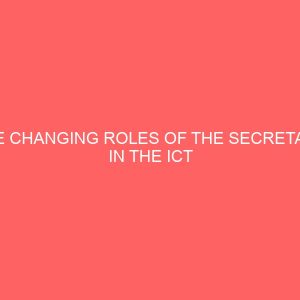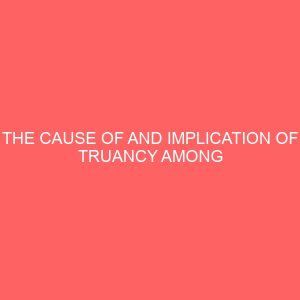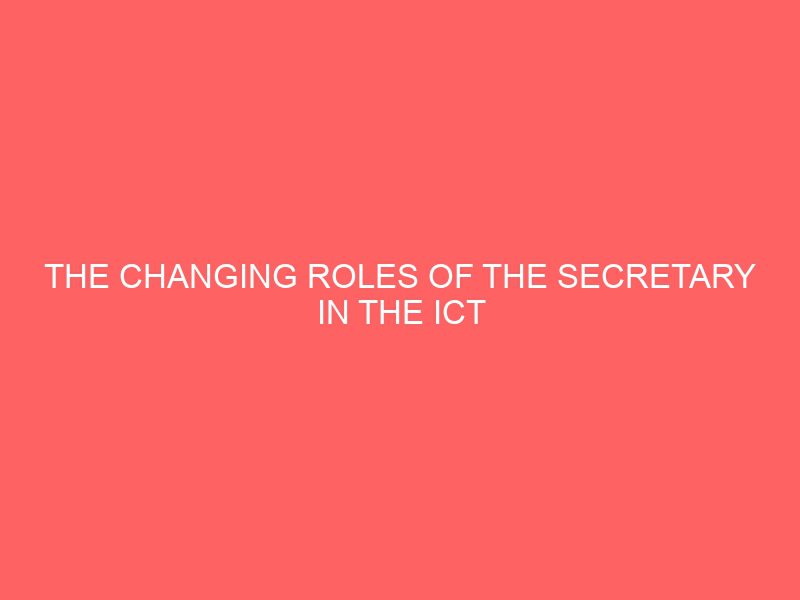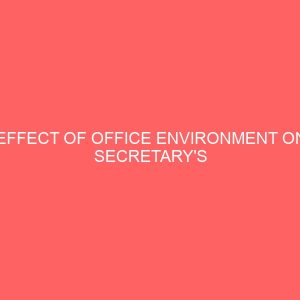Description
THE CHANGING ROLES OF THE SECRETARY IN THE ICT ERA: PROBLEMS AND PROSPECTS
On the early days the secretarial profession was limited to typing, writing and transcribing of shorthand only. But today, it is far beyond this, it involved functions as sorting and retrieving of information passing on information and so on with the help of manual electronic equipment. A secretary assistance to an executive, possessing mastery of office skills and ability to assume responsibilities without direct supervision who display initiative, exercises judgment and makes decision within the scope of his/her authority. The secretary also handles more office jobs, makes and takes decision on behalf of his/her organization. But because of the aforementioned about information communication technology, there are controversies about the future of the secretary in information communication technology.
The term information communication technology was first widely employed in 1981 to describe the equipment and system, which were being introduced in both private and public sectors, to create, store and distribute information since, then, the term has abbreviated to (I.C.T.).
The key feature of modern technology is its ability to deal with information in one form or the other. Trend has been towards using ways of interconnecting the various types of equipments so as to integrate their functions and manage them effectively. Underpinning the definition of “ICT†lies on the modern which provides a helpful explanation of the way in which computers process information.
Information communication technology as the broadly based technology needed to support information systems, which many people today refers to as computer equipment, which aids to increase profit margin and enhance planning, and organization by the use of very fast, accurate and flexible devices in the business society. Efficiency in offices many people believe, is a vital factor in the well being of an organization as it can affect productivity.
1.1 STATEMENT OF THE PROBLEMS
The objective is to assess information communication and examine the problems faced to the modern secretary and the prospects the secretary is expected to meet with. The specific objectives are:
- To examine the changing roles of the secretary in the ICT era.
- To access the problem and threats of information communication technology to the secretarial profession.
- To highlight the challenges posed by the emerge of ICT to a secretary.
1.3 RESEARCH QUESTION
1. Who is a secretary in the information communication technology era?
2 What are the positive and negative effect information communication technology has on the roles of a secretary.
3. What are the problems and the prospects of a secretary in the information communication technology era?
4. What threats does information communication technology pose to the secretary in an organization in this era?
5. What effect has information communication technology on the secretarial profession?
1.4 DELIMITATION
This works covers “the changing roles of the secretary in an ICT era and it is restricted to first bank, oceanic bank and intercontinental bank plc.
1.5 LIMITATION OF THE STUDY
In the course of carrying out this work, certain factors served as time, enough capital, inadequate text books, and as a result of other academic activities going on.
1.6 SIGNIFICANCE OF THE STUDY
The significance of the study has risen from the researcher’s realization of the problem facing a secretary in the information communication technology at first bank, oceanic and interconnected bank plc Kaura Namoda branch, Zamfara State the researcher also realized the prospects of a secretary in the information communication technology. This research work will be valuable assets to government policy makers on privatization and contributing to the successful up-lifting of secretaries in information communication technology.








Reviews
There are no reviews yet.